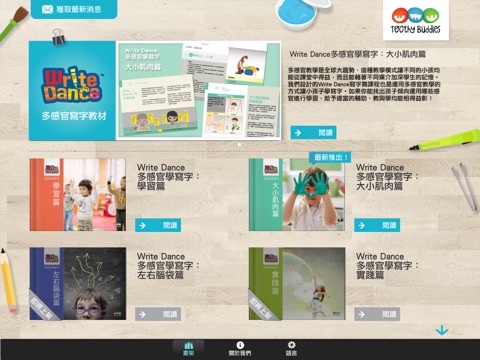
For children aged two to five, one of the biggest hurdles in learning is writing. Write Dance: Learning Writing in a Multisensory Way introduces the write dance principle originated from Europe and America. We have also included improved content, and offered a new way to parents and teachers for teaching children to write. At classes, multisensory teaching is tailored according to learner’s age. The activities and games we developed involve training children’s large-muscle, small-muscle and visual senses. By extending children’s learning from school to home, and inspiring parent coming up with interesting and educational family activities, we hope to make writing more fun and effective.
The e-books on bookshelve introduce the idea of Write Dance and related teaching principle to parents and teachers. We also include automatic adaptative exercises for home training.
Educational e-books:
- Write Dance: Which sensory learning method is best for your child?
Multi-sensory learning is widely adopted around the globe! This teaching method is not just beneficial to children of all learning styles, but also reinforces their learning by stimulating various senses. The Write Dance curriculum that we developed teaches children to write with multisensory experience. Discover which type of sensory learners your children belong to, provide them with the appropriate learning aids, and make learning fun to both of you!
- Write Dance: How to develop your child’s gross and fine motor Skills?
This book outlines the developmental stages of the children’s gross and fine motor skills as they learn writing. A set of home activities are suggested to develop the children’s coordination of their gross and fine motor muscles, shaping up stronger bodies and more importantly, developing an upright and stable writing posture. Learning to write is an easy task!
- Write Dance: Why both sides of the brain matter?
When children pick up the pen and write, both sides of the brain works hand in hand so that their little masters can write or draw accurately with speed. With bilateral and cross midline activities to have fun at home, helps your child build up hemispheric lateralization and specialization, find out their dominant hand with skillful coordination. The practices in this book can be adjusted in terms of difficulties, bridging the communications of the left and right brains, and stimulating the visual, spatial and direction perception skills.
- Write Dance: How to practice with your child at home?
This book shows you how the multi-sensory learning method stimulates children’s kinesthetic, visual, auditory, and tactile senses when they are learning to write. One popular multi-sensory learning in Europe and America is Write Dance, where children receive pre-writing training. In fact, learning to write doesn’t necessarily mean working on the handwriting worksheets with tears in your eyes. Hong Kong Registered Occupational Therapist explains the multi-sensory principles behind Write Dance, so that you can come up with practical but enjoyable writing activities for your kids.
Adaptive Training Exercise:
We have developed a series of learning materials for children with different competences in visual perception. These exercises enhance children’s control of eye movement, image recognition and their perception of direction and space. On shelves soon!
- Level of difficulties of the exercise is automatically adjusted according to children’s performance and abilities.
- The task will not be too easy and bore the kids, but will not be too difficult to disappoint them.
- Different from the exercise on papers, the adaptative exercise are tailor-made with reference to their learning progress and aptitude, fostering children’s independency and individuality in learning.
- Children’s learning progress is recorded, analyzed, and reported for a clearer picture of your children’s development.



